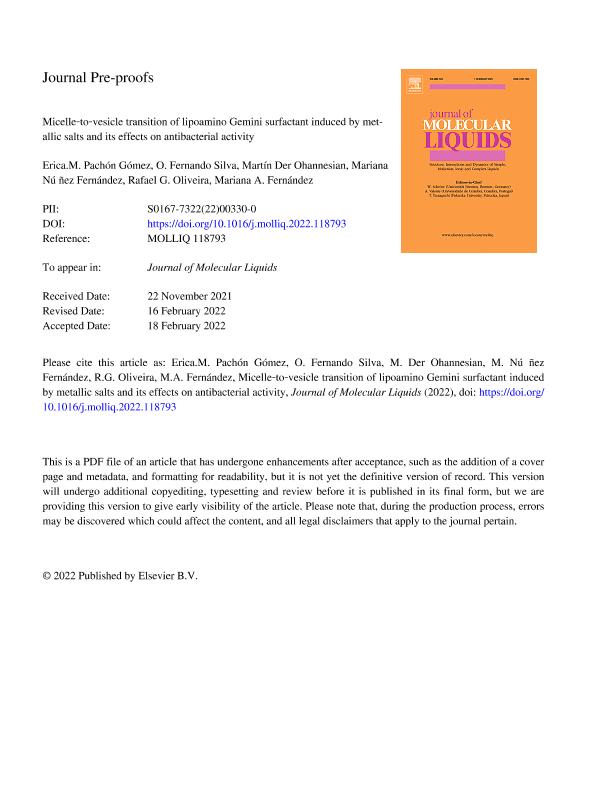Mostrar el registro sencillo del ítem
dc.contributor.author
Pachon Gomez, Erica Marcela

dc.contributor.author
Silva, Oscar Fernando

dc.contributor.author
Der Ohannesian, Martín

dc.contributor.author
Núñez Fernández, Mariana
dc.contributor.author
Oliveira, Rafael Gustavo

dc.contributor.author
Fernández, Mariana Adela

dc.date.available
2023-07-21T12:09:49Z
dc.date.issued
2022-02
dc.identifier.citation
Pachon Gomez, Erica Marcela; Silva, Oscar Fernando; Der Ohannesian, Martín; Núñez Fernández, Mariana; Oliveira, Rafael Gustavo; et al.; Micelle‐to‐vesicle transition of lipoamino Gemini surfactant induced by metallic salts and its effects on antibacterial activity; Elsevier Science; Journal of Molecular Liquids; 353; 118793; 2-2022; 1-8
dc.identifier.issn
0167-7322
dc.identifier.uri
http://hdl.handle.net/11336/204712
dc.description.abstract
Gemini surfactants are amphiphilic molecules formed by two polar heads and two hydrophobic tails joined by a spacer between the polar groups. Their molecular structure gives them particular physico-chemical properties in comparison with their monomeric counterparts. In this work we synthetized a Gemini surfactant (SDDC) derived from the amino acid cystine and decanoic acid. The influence of different metallic salts on the aggregation of the surfactant was studied. SDDC forms core–shell type triaxial ellipsoidal micelles in aqueous solution, but the aggregates suffer a change in morphology, forming vesicles in the presence of copper or silver ions. This behavior was corroborated by TEM and SAXS measurements. With the last technique was possible to estimate that vesicles formed in presence of copper consisted of 7.3 stacked bilayers. It was possible to determine that Cu2+ was reduced to Cu+ in the solution containing SDDC, through EPR and UV–visible spectrophotometry measurements. The reduction of copper was accompanied with the concomitant oxidation of the cystine. The antimicrobial activity of the different aggregates was studied against E. coli and S. aureus and compared with the conventional antibiotic ampicillin. The most efficient system resulted the mixture of SDDC:CuSO4/10:1 against the Gram-negative bacterium, there with the minimum concentration used (0.01 mM) was possible to inhibit 70 % of growth. The new systems characterized in this work have many possibilities for potential applications, mainly in the area of drug delivery systems, templates in the synthesis of nanomaterials or as antibacterial compounds.
dc.format
application/pdf
dc.language.iso
eng
dc.publisher
Elsevier Science

dc.rights
info:eu-repo/semantics/openAccess
dc.rights.uri
https://creativecommons.org/licenses/by-nc-nd/2.5/ar/
dc.subject
AMINO ACID DERIVATIVE SURFACTANT
dc.subject
ANTIBACTERIAL ACTIVITY
dc.subject
GEMINI SURFACTANT
dc.subject
LIPOAMINO ACID SURFACTANT
dc.subject
METALLOSURFACTANTS
dc.subject
VESICLES
dc.subject.classification
Química Coloidal

dc.subject.classification
Ciencias Químicas

dc.subject.classification
CIENCIAS NATURALES Y EXACTAS

dc.title
Micelle‐to‐vesicle transition of lipoamino Gemini surfactant induced by metallic salts and its effects on antibacterial activity
dc.type
info:eu-repo/semantics/article
dc.type
info:ar-repo/semantics/artículo
dc.type
info:eu-repo/semantics/publishedVersion
dc.date.updated
2023-07-07T17:08:44Z
dc.journal.volume
353
dc.journal.number
118793
dc.journal.pagination
1-8
dc.journal.pais
Países Bajos

dc.journal.ciudad
Amsterdam
dc.description.fil
Fil: Pachon Gomez, Erica Marcela. Consejo Nacional de Investigaciones Científicas y Técnicas. Centro Científico Tecnológico Conicet - Córdoba. Instituto de Investigaciones en Físico-química de Córdoba. Universidad Nacional de Córdoba. Facultad de Ciencias Químicas. Instituto de Investigaciones en Físico-química de Córdoba; Argentina
dc.description.fil
Fil: Silva, Oscar Fernando. Consejo Nacional de Investigaciones Científicas y Técnicas. Centro Científico Tecnológico Conicet - Córdoba. Instituto de Investigaciones en Físico-química de Córdoba. Universidad Nacional de Córdoba. Facultad de Ciencias Químicas. Instituto de Investigaciones en Físico-química de Córdoba; Argentina
dc.description.fil
Fil: Der Ohannesian, Martín. Universidad Nacional de Córdoba. Facultad de Ciencias Químicas. Centro de Química Aplicada; Argentina
dc.description.fil
Fil: Núñez Fernández, Mariana. Universidad Nacional de Córdoba. Facultad de Ciencias Químicas. Centro de Química Aplicada; Argentina
dc.description.fil
Fil: Oliveira, Rafael Gustavo. Consejo Nacional de Investigaciones Científicas y Técnicas. Centro Científico Tecnológico Conicet - Córdoba. Centro de Investigaciones en Química Biológica de Córdoba. Universidad Nacional de Córdoba. Facultad de Ciencias Químicas. Centro de Investigaciones en Química Biológica de Córdoba; Argentina
dc.description.fil
Fil: Fernández, Mariana Adela. Consejo Nacional de Investigaciones Científicas y Técnicas. Centro Científico Tecnológico Conicet - Córdoba. Instituto de Investigaciones en Físico-química de Córdoba. Universidad Nacional de Córdoba. Facultad de Ciencias Químicas. Instituto de Investigaciones en Físico-química de Córdoba; Argentina
dc.journal.title
Journal of Molecular Liquids

dc.relation.alternativeid
info:eu-repo/semantics/altIdentifier/url/https://www.sciencedirect.com/science/article/pii/S0167732222003300
dc.relation.alternativeid
info:eu-repo/semantics/altIdentifier/doi/http://dx.doi.org/10.1016/j.molliq.2022.118793
Archivos asociados
